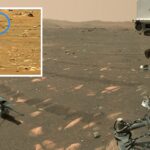A Falcon 9 rocket carrying NASA’s small IXPE X-ray observatory satellite is on schedule to launch as early as 1 a.m. EST (06:00 a.m. UTC) on Thursday, December 9th, marking SpaceX’s 28th launch of 2021.
The 330 kilograms (730 lb) spacecraft will be Falcon 9’s lone cargo, making IXPE the rocket’s 11-year history’s smallest dedicated payload. Aside from the extraordinary record, IXPE will be SpaceX’s second NASA LSP launch in less than two weeks and the first time NASA has entrusted a payload to a Falcon booster’s fifth mission.
IXPE will be the sixth launch and drone ship landing attempt for Falcon 9 B1061 in 13 months, with four of those being for NASA. To the list of eight astronauts, three Dragons, and a geostationary communications satellite that the launcher has helped launch, IXPE will eventually add a first-of-its-kind space-based observatory.
The #Falcon9 is on the pad and ready to launch #IXPE for @nasa! Currently scheduled for 1:00 AM EST Dec. 9th. IXPE will help give us a new look at the universe and measure the polarization of cosmic x-rays. #SpaceX
📸 for @Teslarati pic.twitter.com/mhRWSMX2FP
— Richard Angle (@RDAnglePhoto) December 8, 2021
The mission will also be SpaceX’s 28th launch of 2021, breaking the company’s previous annual cadence record of 26 flights (established last year) earlier this month. SpaceX, on the other hand, looks to be on schedule for three more launches following IXPE, which would make December 2021 the first time the firm has launched five times in a month.
Next, SpaceX will launch Turkey’s Turksat 5B geostationary communications satellite on December 18th at 11:58 p.m. EST (04:58 p.m. UTC). On December 21st, at 5:06 a.m. EST (10:06 a.m. UTC), SpaceX plans to launch Cargo Dragon 2’s CRS-24 space station resupply mission.
SpaceX might possibly launch one more Starlink mission for the year in the second part of the month, most likely from its Vandenberg, California facility.
At least four more SpaceX missions are provisionally slated to launch in January 2022, indicating that, after an unusually quiet third quarter, SpaceX is returning to its normal cadence of three to four launches per month, as it did in the first half of 2021.



